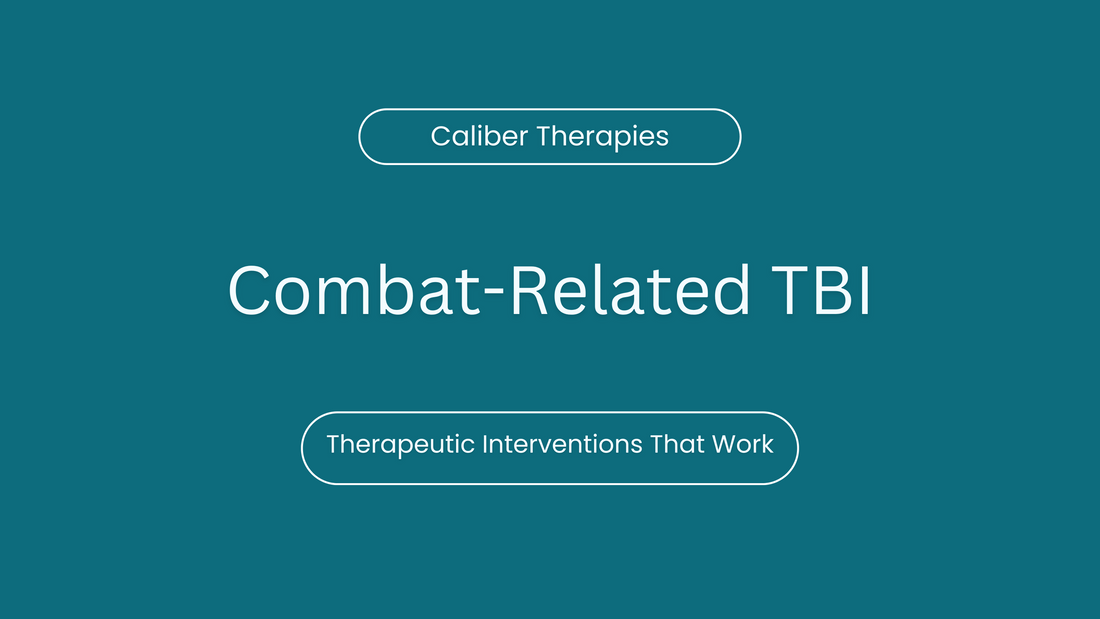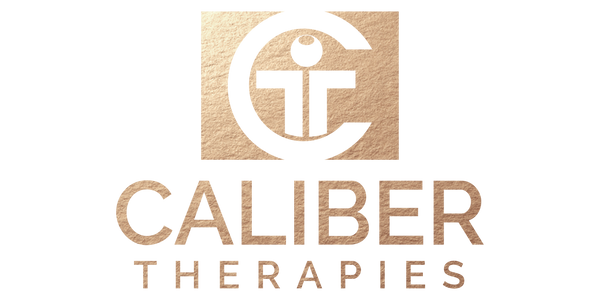
Combat-Related TBI: Therapeutic Interventions That Work
Share
Combat-related traumatic brain injury (TBI) has emerged as one of the most significant health challenges facing our military veterans and active service members. Often called the "invisible wound of war," combat-related TBI affects hundreds of thousands of veterans, presenting unique challenges that require specialized therapeutic approaches. Unlike civilian TBI, combat-related brain injuries frequently occur alongside other conditions such as PTSD, hearing loss, and orthopedic injuries, creating complex clinical presentations that demand comprehensive, coordinated care.
For veterans and their families navigating the aftermath of combat-related TBI, understanding which therapeutic interventions have proven most effective is crucial for recovery and long-term success. The landscape of TBI treatment has evolved significantly in recent years, with evidence-based interventions offering hope and tangible improvement for those affected by these challenging injuries.
Understanding Combat-Related TBI
Combat-related traumatic brain injury differs significantly from civilian TBI in both mechanism of injury and clinical presentation. The majority of combat-related TBIs result from explosive blast injuries, which create unique patterns of brain damage not commonly seen in civilian populations.
Mechanisms of Combat-Related TBI
Blast Injuries are the primary cause of combat-related TBI, occurring through multiple mechanisms including primary blast injury from pressure waves, secondary injury from projectiles and debris, and tertiary injury from body displacement. These complex injuries often involve multiple trauma mechanisms occurring simultaneously.
Penetrating Injuries from gunshot wounds and shrapnel create focal brain damage with specific neurological deficits, while Blunt Force Trauma from vehicle accidents and falls during combat operations add additional complexity to the injury pattern.
Unique Characteristics
Combat-related brain injuries often present with multiple injury mechanisms occurring simultaneously, frequent co-occurrence with PTSD and other mental health conditions, associated sensory impairments, and polytrauma involving multiple body systems. Perhaps most significantly, delayed symptom recognition often occurs due to adrenaline and combat stress, meaning injuries may not be immediately apparent.
Evidence-Based Therapeutic Interventions
Effective treatment of combat-related TBI requires interventions supported by robust scientific evidence and adapted for the unique needs of military populations.
Comprehensive Assessment
Before beginning any therapeutic intervention, thorough assessment is crucial. This includes neuropsychological testing to evaluate cognitive functions, advanced neuroimaging to identify structural brain changes, functional assessment of daily living skills, and comprehensive mental health screening for co-occurring conditions such as PTSD, depression, and anxiety.
Multidisciplinary Team Approach
The most effective interventions involve coordinated care from multiple specialists including neurologists, neuropsychologists, physical and occupational therapists, speech-language pathologists, mental health professionals, recreation therapists, and social workers. This team-based approach ensures that all aspects of recovery are addressed simultaneously.
Treatment Timing
Research indicates that early, intensive intervention produces the best outcomes. The acute phase (0-6 months) focuses on stabilization and preventing secondary complications, the subacute phase (6-24 months) emphasizes intensive rehabilitation and skill rebuilding, while the chronic phase (2+ years) concentrates on maintenance, adaptation, and quality of life enhancement.
Cognitive Rehabilitation Strategies
Cognitive rehabilitation forms the cornerstone of effective TBI treatment, addressing the thinking and memory problems that most significantly impact daily functioning.
Attention and Concentration Training
Attention Process Training (APT) provides a systematic approach to rebuilding attention skills through graduated exercises targeting sustained attention, selective attention, alternating attention, and divided attention abilities. Computer-based attention training programs like CogMed and BrainHQ offer structured, adaptive training that adjusts difficulty based on individual performance.
Memory Rehabilitation
Effective memory rehabilitation combines external memory aids such as smartphones, apps, written organization systems, and environmental cues with internal memory strategies including visualization techniques, verbal rehearsal, association methods, and story-telling memory techniques.
Executive Function Training
Problem-solving training improves goal setting, decision-making processes, self-monitoring, and flexible thinking. Time management and organization skills training addresses schedule management, task prioritization, breaking complex tasks into manageable steps, and developing effective routines and systems.
Physical and Occupational Therapy Approaches
Physical and motor impairments following combat-related TBI require specialized therapeutic approaches that address both neurological and orthopedic complications.
Physical Therapy Interventions
Balance and Vestibular Training is critical for addressing balance problems common in blast-related TBI. This includes vestibular rehabilitation exercises, balance retraining programs, fall prevention strategies, and gait training for mobility improvement.
Strength and Endurance Training involves adapted programs addressing overall conditioning, specific muscle group strengthening, cardiovascular endurance, and fatigue management techniques specifically designed for individuals with brain injury.
Occupational Therapy Focus Areas
Activities of Daily Living (ADL) Training focuses on practical skills for independence including self-care activities, home management tasks, cooking and meal preparation, and financial management skills.
Cognitive-Motor Integration addresses the complex interaction between thinking and movement through dual-task training, complex activity performance, safety awareness development, and driving evaluation and training when appropriate.
Work and Career Rehabilitation includes vocational assessment and planning, workplace accommodations, job skill development, and comprehensive return-to-work strategies tailored to individual capabilities and goals.
Speech-Language Therapy for TBI
Communication and swallowing difficulties following combat-related TBI can significantly impact quality of life and require specialized intervention from speech-language pathologists.
Communication Disorders in Combat-Related TBI
Cognitive-Communication Impairments are the most common form, affecting organization of thoughts and ideas, word-finding abilities, social communication skills, and reading and writing abilities. Motor speech disorders such as dysarthria may result from muscle weakness, coordination difficulties, or respiratory support problems.
Evidence-Based Speech Therapy Interventions
Cognitive-Communication Training includes structured programs addressing conversation skills and pragmatics, narrative organization and structure, reading comprehension strategies, and written expression techniques. Attention and memory support strategies help improve attention to communication partners, memory for conversations, following complex directions, and information processing speed.
When appropriate, technology-assisted communication including augmentative and alternative communication devices, communication apps and software, and voice amplification systems can significantly enhance communication abilities.
Mental Health and PTSD Co-Treatment
The intersection of combat-related TBI and mental health conditions, particularly PTSD, requires integrated treatment approaches that address both conditions simultaneously.
Understanding TBI-PTSD Comorbidity
Research indicates that 60-80% of veterans with combat-related TBI also meet criteria for PTSD, creating complex symptom presentations with overlapping symptoms, compounding effects on daily functioning, and challenges in differential diagnosis that necessitate coordinated treatment approaches.
Integrated Treatment Models
Cognitive Processing Therapy (CPT) adapted for TBI populations includes modified pacing and repetition, written worksheets and memory aids, simplified homework assignments, and extended treatment duration to accommodate cognitive challenges.
Prolonged Exposure Therapy with TBI accommodations features shorter session lengths, frequent breaks and summaries, visual aids and written materials, and increased family involvement and support.
Depression and Anxiety Management
Cognitive Behavioral Therapy (CBT) adapted for TBI includes concrete, practical strategies, written materials and handouts, shorter and more frequent sessions, and behavioral activation techniques specifically designed for individuals with cognitive impairments.
Mindfulness-Based Interventions such as mindfulness-based stress reduction, acceptance and commitment therapy, meditation and relaxation training, and body awareness practices can be particularly effective for managing emotional regulation challenges common in TBI.
Family-Centered Treatment Approaches
Combat-related TBI affects entire family systems, making family-centered treatment approaches essential for optimal outcomes.
Family Education and Training
Comprehensive family education covers brain injury basics and recovery processes, common symptoms and their impacts, expected recovery trajectories, and when to seek additional help. Communication strategies training teaches families effective communication techniques, methods for managing behavioral changes, ways to support cognitive rehabilitation, and approaches for reducing family stress and conflict.
Family Therapy and Support
Systemic Family Therapy addresses relationship changes and role adjustments, communication patterns, conflict resolution, and rebuilding intimacy and connection that may be disrupted by brain injury. Support groups facilitate connections with other military families facing similar challenges, providing peer support, resource sharing opportunities, and emotional support and understanding.
Caregiver Support
Specialized caregiver training programs focus on stress management and self-care, boundary setting and personal time, accessing community resources, and long-term planning and preparation. Respite services provide temporary care relief, social and recreational opportunities, professional support and guidance, and time for personal activities and relationships.
Navigating Healthcare Systems
Understanding how to access and coordinate care within military and veteran healthcare systems is crucial for receiving appropriate combat-related TBI treatment.
VA Healthcare Benefits
Service-Connected Disability benefits include understanding disability rating processes, benefits eligibility and enrollment, priority group assignments, and appeals and review procedures. Specialized TBI programs through the VA include polytrauma rehabilitation centers, TBI specialty clinics, intensive outpatient programs, and community-based rehabilitation services.
Military Health System (TRICARE)
Active duty coverage includes comprehensive rehabilitation services, specialized TBI treatment programs, family support services, and coordination with civilian providers when necessary. Family member benefits provide coverage for dependent services, counseling and support programs, respite care assistance, and educational and vocational support.
Building a Comprehensive Treatment Plan
Effective combat-related TBI treatment requires individualized, comprehensive planning that addresses all aspects of recovery and adjustment.
Assessment and Goal Setting
Comprehensive evaluation includes medical and neurological assessment, neuropsychological testing, functional capacity evaluation, and family and social assessment. Collaborative goal setting involves veteran and family preferences, realistic and measurable objectives, short-term and long-term planning, and regular review and adjustment processes.
Treatment Coordination
Effective team communication ensures regular meetings and updates, shared treatment goals and approaches, coordinated scheduling and planning, and ongoing progress monitoring and adjustment. Care management includes single point of contact coordination, resource identification and access, insurance and benefit navigation, and crisis intervention planning.
Long-Term Planning
Community integration preparation includes independent living arrangements, employment and career planning, social and recreational participation, and ongoing healthcare needs assessment. Maintenance and follow-up establish regular check-in schedules, booster session planning, crisis intervention protocols, and long-term support systems.
Conclusion
Combat-related TBI presents unique challenges that require specialized, evidence-based therapeutic interventions delivered within a comprehensive, coordinated framework. The most effective treatments combine proven rehabilitation approaches with innovative therapies, always delivered within a family-centered model that recognizes the impact of brain injury on entire family systems.
Recovery from combat-related TBI is possible, and the therapeutic interventions outlined in this guide have demonstrated effectiveness in helping veterans regain function, independence, and quality of life. The key to success lies in early intervention, comprehensive assessment, coordinated care, and individualized treatment planning that addresses each person's unique needs, goals, and circumstances.
While the journey of recovery from combat-related TBI can be challenging, veterans and their families can take hope in the growing body of evidence supporting effective interventions. With access to appropriate care, strong support systems, and evidence-based treatments, individuals with combat-related TBI can achieve meaningful recovery and successful community reintegration.
At Caliber Therapies, we understand the unique challenges facing veterans with combat-related TBI and their families. Our specialized team of therapists has extensive experience working with military populations and is committed to providing evidence-based, comprehensive care that honors your service while supporting your recovery journey. Contact us today to learn more about our veteran-focused TBI programs and how we can help you or your loved one achieve optimal recovery outcomes.
